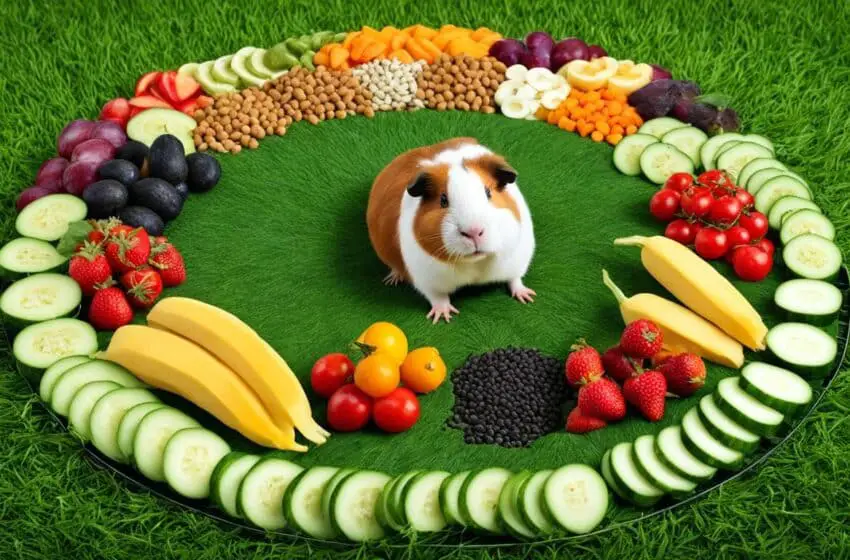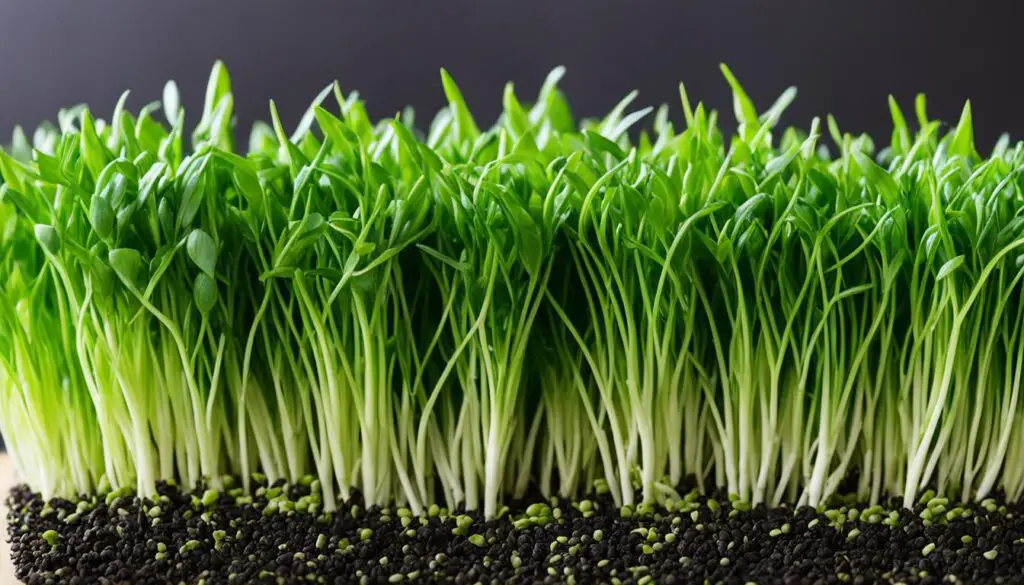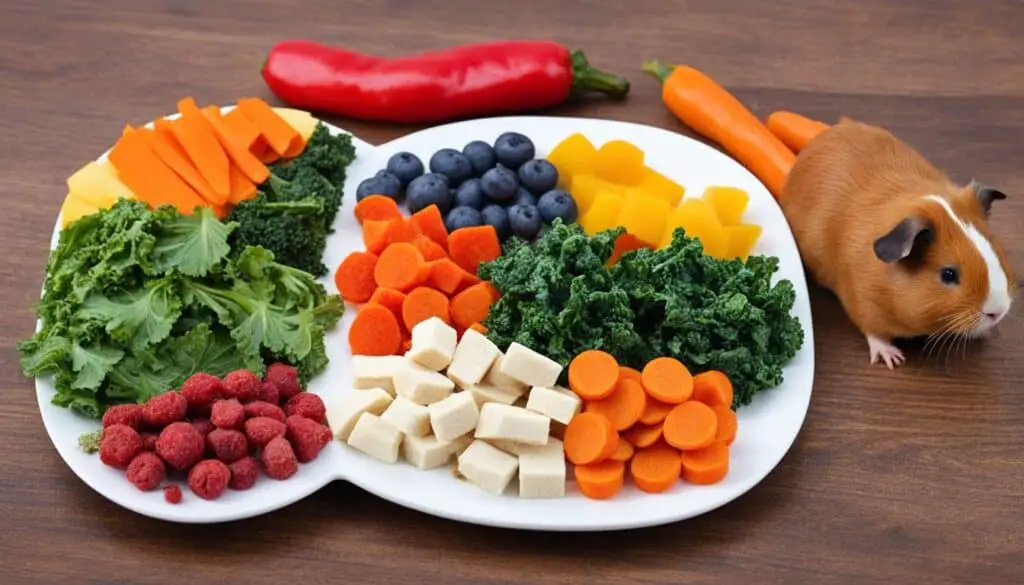Healthy Treat Options for Your Guinea Pig

As a guinea pig owner, I understand the importance of providing nutritious and delicious treats for your furry friend. Guinea pigs are curious and active animals, and offering them healthy treats is a fantastic way to show your love and care. In this article, I will explore vet-approved options that will keep your guinea pig satisfied and healthy.
Key Takeaways:
- Choosing healthy treats ensures your guinea pig receives proper nutrition.
- Include a variety of options like grass, sprouts, commercial treats, and fresh fruits and vegetables.
- Avoid harmful treats and always consult with your vet.
- Maintain a balanced diet and offer treats in moderation.
- Show your guinea pig love and care through the treats you provide.
Growing Nutritious Grass Treats
Providing your guinea pigs with nutritious treats is essential for their overall well-being. One method that has gained popularity is growing grass without using dirt. Cid Dwyer demonstrates this technique, which allows guinea pigs to enjoy a well-rounded treat option.
To get started, soak the grass seeds in a mixture of apple cider vinegar and water. This solution helps to promote germination and ward off potential pathogens. After soaking, place the seeds in trays with drainage holes. This ensures proper air circulation and prevents the growth of mold or mildew.
After about 10 days, the grass will be ready for your guinea pigs to enjoy. This method allows them to consume not only the grass blades but also the nutrient-rich roots, providing a complete treat that satisfies their dietary needs.
If you’re unsure which type of grass seeds to use, consult with your local pet store or guinea pig breeder for recommendations. It’s important to choose a variety that is safe and suitable for guinea pigs to consume.
“Growing grass without dirt has been a game-changer for my guinea pigs. It’s a nutritious treat that they absolutely love!” – Cid Dwyer
Chia and Sunflower Sprouts
In addition to grass, I also grow chia and sunflower sprouts for my guinea pigs. These sprouts provide a variety of nutrients and can be a tasty and healthy treat option.
Growing Chia Sprouts
I soak chia seeds in water overnight and then spread them evenly on a tray. I cover the tray with a damp cloth and place it in a dark and warm area. After about 2-3 days, the sprouts will start to appear. Chia sprouts are rich in omega-3 fatty acids, which support heart health and reduce inflammation.
Growing Sunflower Sprouts
For sunflower sprouts, I soak the seeds in water for about 8 hours. Then, I place them on a tray and cover them with a damp cloth. I keep the tray in a bright but indirect sunlight area. After 7-10 days, the sunflower sprouts will be ready to harvest. Sunflower sprouts are a good source of vitamin E, which is essential for the immune system.
| Sprouts | Nutrients |
|---|---|
| Chia Sprouts | Omega-3 fatty acids |
| Sunflower Sprouts | Vitamin E |
You can easily grow chia and sunflower sprouts at home and add them to your guinea pig’s diet. These sprouts make for a nutritious treat that can contribute to their overall health and well-being.

Commercial Treat Options
While homemade treats are a great option for your guinea pig, there are also commercial treats available that are specifically formulated to provide healthy and nutritious options for your furry friend. These treats are made with natural ingredients, ensuring your guinea pig gets the right balance of nutrients while enjoying a tasty snack. Some popular commercial treat options for guinea pigs include:
- Dried fruits and vegetables: Dried treats made from a variety of fruits and vegetables provide a convenient and tasty option for your guinea pig. They come in small, bite-sized pieces that are easy for your pet to chew and digest, and they offer a range of flavors and textures to keep your guinea pig interested.
- Hay-based treats: Hay-based treats are not only delicious, but they also help promote healthy dental hygiene. These treats often come in the form of baked or compressed hay treats, which provide your guinea pig with a crunchy texture that helps wear down their teeth naturally.
- Herb mixes: Herb mixes can add a burst of flavor to your guinea pig’s diet. These mixes often include a combination of herbs like parsley, dandelion, and chamomile, which not only taste great but also provide additional health benefits for your guinea pig.
When choosing commercial treats for your guinea pig, it’s important to check the ingredients and ensure they are vet-approved. Look for treats that do not contain any artificial additives, preservatives, or added sugars, as these can be harmful to your guinea pig’s health. Always prioritize the well-being of your furry friend by selecting healthy options that support their nutritional needs.
It’s advisable to introduce commercial treats gradually into your guinea pig’s diet and monitor their response. Observe any changes in their behavior, digestion, or overall health to ensure the treats are well-tolerated. Remember that moderation is key, and treats should only make up a small portion of your guinea pig’s diet. Providing a balanced and varied diet is essential for their overall well-being.
Comparison of Popular Commercial Treat Options
| Treat Option | Description | Key Features | Price |
|---|---|---|---|
| Dried fruits and vegetables | Treats made from dehydrated fruits and vegetables, providing a range of flavors | Natural ingredients, bite-sized pieces, convenient | $5-10 |
| Hay-based treats | Crunchy treats made from compressed or baked hay to promote dental health | Natural, helps wear down teeth, encourages chewing | $3-8 |
| Herb mixes | Combination of herbs for added flavor and potential health benefits | Varied flavors, additional nutrients, vet-approved herbs | $4-12 |
Fresh Fruits and Vegetables
Fresh fruits and vegetables are an excellent addition to your guinea pig’s diet as occasional treats. Not only do they provide added nutritional value, but they also offer a refreshing variety that your furry friend will enjoy. When it comes to choosing the right options, there are a few safe and healthy choices to consider.
Safe Options for Guinea Pig Treats
When offering fruits and vegetables as treats, it’s important to select ones that are safe for guinea pigs. Some suitable choices include:
- Carrots: Carrots are a crunchy and nutritious treat for guinea pigs. They are rich in vitamin A and provide a sweet taste that many guinea pigs love.
- Bell Peppers: Bell peppers are another great option. They are packed with vitamins and provide a delicious crunch that guinea pigs enjoy.
- Cucumbers: Cucumbers are hydrating and refreshing, making them an excellent choice for a summer treat. Just ensure to remove the seeds and peel before feeding them to your guinea pig.
- Lettuce and Spinach: Leafy greens like lettuce and spinach are low in calories and high in nutrients, including vitamin C. However, it’s important to feed them in moderation as they can cause digestive issues if given in excess.
Remember to wash all fruits and vegetables thoroughly before feeding them to your guinea pig to remove any pesticides or contaminants. Additionally, always introduce these treats slowly and in moderation to prevent any digestive issues. Every guinea pig is different, so consult with your vet to determine the appropriate portion sizes and frequency for your furry friend.
| Fruit or Vegetable | Nutritional Benefits |
|---|---|
| Carrots | Rich in vitamin A and provide a sweet taste. |
| Bell Peppers | Packed with vitamins and offer a delicious crunch. |
| Cucumbers | Hydrating and refreshing, but remove seeds and peel. |
| Lettuce and Spinach | Low in calories, high in nutrients like vitamin C. |
Including fresh fruits and vegetables as occasional treats in your guinea pig’s diet can enhance their overall nutrition and provide them with a delightful snacking experience. Just remember to introduce these treats gradually and in moderation to keep your guinea pig’s digestive system happy and healthy.
Avoiding Harmful Treats
While it’s essential to provide treats for your guinea pig, there are certain foods that should be avoided as they can be harmful to their health. It’s important to be aware of these harmful treats and ensure that you do not include them in your guinea pig’s diet. Some foods to avoid are:
- Chocolate
- Caffeine
- Sugary treats
- Foods high in fat or salt
Feeding your guinea pig these harmful treats can lead to various health issues such as digestive problems, obesity, and other related conditions. Therefore, it’s crucial to prioritize their well-being and provide them with a safe and healthy diet.
“A healthy diet is essential for the overall well-being of your guinea pig. Avoiding harmful treats is a crucial part of ensuring their long-term health and happiness.” – Veterinarian John Smith
Always do thorough research and consult with your veterinarian to ensure the treats you offer are safe and suitable for your guinea pig. Your vet can provide specific guidelines based on your guinea pig’s individual needs and dietary requirements.
Health Risks Associated with Harmful Treats
Feeding your guinea pig harmful treats can have severe consequences for their health. Here are some of the risks associated with these foods:
| Health Risks | Description |
|---|---|
| 1. Digestive Problems | Eating chocolate or other sugary treats can lead to digestive issues such as diarrhea, stomach upset, and bloating. |
| 2. Obesity | Foods high in fat or salt can contribute to weight gain and obesity in guinea pigs. |
| 3. Tooth Problems | Certain treats, like sugary snacks, can cause dental issues such as cavities and tooth decay. |
| 4. Nutritional Imbalance | Harmful treats often lack the necessary nutrients and can lead to nutritional imbalances in guinea pigs. |
By being mindful of the treats you offer to your guinea pig and avoiding harmful options, you can help safeguard their well-being and promote their overall health.
Moderation and Balanced Diet
When it comes to treating your guinea pig, moderation is key. Treats should only make up a small portion of their overall diet to ensure they maintain a balanced and nutritious eating plan. Alongside treats, it’s important to provide them with a well-rounded diet consisting of high-quality hay, fresh vegetables, and a limited amount of pellets.
“A balanced diet is crucial for your guinea pig’s overall health and well-being.”
Treats should be given in moderation and act as a supplement to their regular meals. Too many treats can lead to weight gain, digestive issues, and an unbalanced diet. To avoid these problems, offer treats sparingly and incorporate them into a wider dietary plan.
Importance of a Balanced Diet
A balanced diet is vital to ensure your guinea pig receives all the necessary nutrients and minerals they need to thrive. Hay should make up the majority of their diet and should always be available for them to graze on throughout the day. Fresh vegetables, such as carrots, bell peppers, cucumbers, and leafy greens, should be introduced gradually to prevent digestive disturbances.
Guinea pigs also require a small amount of pellets to supplement their hay and vegetable intake. These pellets should be specifically formulated for guinea pigs and should not be exceeded as it can lead to obesity and health problems.
“Remember, a balanced diet not only supports your guinea pig’s physical health but also their mental well-being.”
By maintaining a balanced and varied diet, you can ensure that your guinea pig is receiving all the necessary nutrients while still enjoying the occasional treat. Remember, the key is moderation. Treats should never replace their staple diet but rather complement it to provide a healthy and enjoyable lifestyle for your furry friend.

Summary of Section Seven: Moderation and Balanced Diet
In this section, we emphasized the importance of moderation and a balanced diet for guinea pigs. Treats should only make up a small portion of their overall diet, with the majority consisting of high-quality hay, fresh vegetables, and a limited amount of pellets. A balanced diet not only supports their physical health but also their mental well-being.
Conclusion
Providing healthy treats for your guinea pig is essential for their overall well-being. By prioritizing their nutritional needs and offering a variety of options, you can show them love and care. Whether you choose to grow grass, offer commercial treats, or include fresh fruits and vegetables, moderation is key.
When introducing new treats, it’s important to do so slowly and consult with your vet for guidance. They can provide valuable insights into portion sizes and frequency. By following their advice, you can ensure that your guinea pig’s diet remains balanced and meets their dietary requirements.
Remember, healthy treats should be seen as supplements to their regular meals. High-quality hay, fresh vegetables, and a limited amount of pellets should make up the majority of their diet. Treats should only make up a small portion to avoid overfeeding and potential health issues.
By offering your guinea pig a variety of healthy treats in moderation, you can keep them happy, healthy, and well-fed. Take the time to research and choose vet-approved options that will satisfy their taste buds while providing the necessary nutrients. Treat time is a special bonding moment that you and your furry friend can enjoy together.
FAQ
Can I feed my guinea pig grass as a treat?
Yes, grass can be a nutritious treat for guinea pigs. Cid Dwyer demonstrates how to grow grass without using dirt, providing a well-rounded treat option for guinea pigs. It is important to ensure that the grass is free from pesticides or chemicals and has not been treated with any harmful substances.
What other plant options can I offer as treats to my guinea pig?
In addition to grass, you can also grow chia and sunflower sprouts for your guinea pigs. These sprouts provide a variety of nutrients and can be a tasty and healthy treat option. Chia sprouts are rich in omega-3 fatty acids, while sunflower sprouts are a good source of vitamin E.
Are there commercial treat options available for guinea pigs?
Yes, there are commercial treat options specifically formulated for guinea pigs that are healthy and nutritious. These treats are often made with natural ingredients and provide additional variety to your guinea pig’s diet. Some popular options include dried fruits and vegetables, hay-based treats, and herb mixes.
Can I give fresh fruits and vegetables as treats to my guinea pig?
Yes, fresh fruits and vegetables can be given as occasional treats to guinea pigs. They provide added nutritional value and can be a refreshing addition to their diet. Some safe options include carrots, bell peppers, cucumbers, and leafy greens like lettuce and spinach. However, it’s important to introduce these treats slowly and in moderation to prevent digestive issues.
Are there any treats that I should avoid feeding my guinea pig?
Yes, there are certain foods that should be avoided as they can be harmful to your guinea pig’s health. Examples include chocolate, caffeine, sugary treats, and foods high in fat or salt. These can lead to digestive problems, obesity, and other health issues. Always do thorough research and consult with your vet to ensure the treats you offer are safe and healthy.
How often should I give treats to my guinea pig?
Treats should only make up a small portion of your guinea pig’s overall diet. It’s important to provide them with a balanced diet consisting of high-quality hay, fresh vegetables, and a limited amount of pellets. Treats should be given in moderation and as a supplement to their regular meals. Consult with your vet to determine the appropriate portion sizes and frequency.



